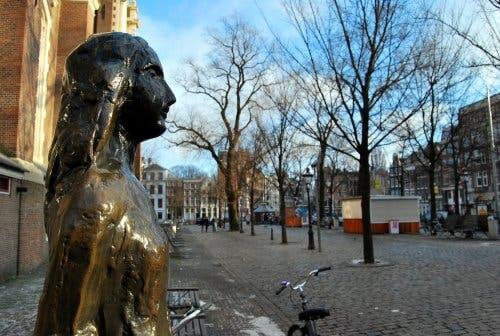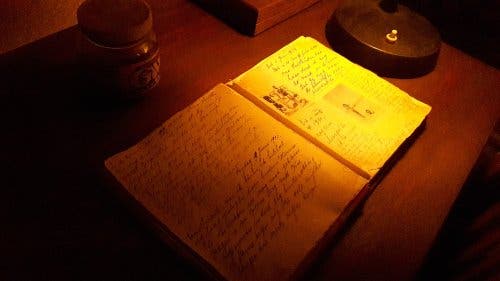6 Lessons to Learn from The Diary of Anne Frank

There are many classic books that, despite the passage of time, remain best sellers, as is the case of The Diary of Anne Frank. People around the world continue to read about the daily life and reflections that the 12-year-old main character of the story tells while in hiding during World War II.
The reason why this story continues to be so significant almost 75 years later is the reality that it shows and the many lessons the young girl offers to readers. Today, we want to provide a compilation of valuable lessons to learn from The Diary of Anne Frank.
Lessons to learn from The Diary of Anne Frank
1. “Whoever is happy will make others happy.”
Without a doubt, this is one of the best-known phrases of this classic book’s main character. It shows the vitality, optimism, and happiness that Anne gives off, despite the complicated situation that she had to live during her childhood.
What Anne Frank wanted to show with this phrase is that, regardless of the circumstances that you have to live, you must face life with optimism and happiness. In addition, you must make those around you happy, since, that way, they’ll also make you happy. Therefore, Anne knew that one of the essential parts of life was being happy.

2. “People can tell you to keep your mouth shut, but that doesn’t stop you from having your own opinion.”
With this phrase, you can see the evolution of life and of the different situations that teens of the past had to live in comparison with those of today.
No one would say that a 12-year-old girl said this phrase. However, Anne, from a very young age, was clear about her political ideals and always wanted to express them, in a subtle way due to the situations of the time, through her diary.
This phrase shows that Anne had to mature “prematurely”, going from childhood to adulthood in the blink of an eye.
3. “I don’t see the misery there is, but the beauty that still remains” – one of the lessons to learn from The Diary of Anne Frank
Thousands of Jews hiding in their homes, thousands more suffering in concentration camps, and many more dead. But, in spite of all the misfortunes and miseries that Anne heard of while she was in hiding, she always knew how to turn the situation around and think of all the good things that would come when all this ended.
More lessons to learn from The Diary of Anne Frank
4. “Ordinary people simply don’t know what books mean to us, shut up here. Reading, learning, and the radio are our amusements.”
This is one of the most fantastic lessons in The Diary of Anne Frank. Anne’s passion for writing was linked to her passion for reading, because, for her, books were an escape route and a way to continue learning.
For Anne, books were her friends. As she wasn’t able to go outside for months, she didn’t have many entertainment options.
For this reason, Anne Frank describes books as her greatest allies during the time she was in hiding, an escape route to keep her head and mind focused.

5. “Women should be respected as well! Generally speaking, men are held in great esteem in all parts of the world, so why shouldn’t women have their share?”
The figure of women and equality between men and women is one of the most popular topics nowadays. However, it’s fascinating how, 75 years ago, a 12-year-old girl was aware of social inequalities, much more aggravated at that time, that existed and continue to exist.
Along these lines, you can see Anne Frank’s awareness of the little respect and importance women get compared to men in any area of life. This is an aspect that, to this day, society is still trying to eradicate.
6. “How wonderful it is that nobody need wait a single moment before starting to improve the world.”
Another of the lessons to learn from The Diary of Anne Frank that has the most impact is, without a doubt, this one. The thought and idea of changing the world with small actions and decisions isn’t common in children of such a young age. However, once again, Anne Frank shows her maturity.
With this phrase, the main character of this book wants to show that the world can improve with small actions, and that no one should wait if they want to change some aspect of their life.
There are many classic books that, despite the passage of time, remain best sellers, as is the case of The Diary of Anne Frank. People around the world continue to read about the daily life and reflections that the 12-year-old main character of the story tells while in hiding during World War II.
The reason why this story continues to be so significant almost 75 years later is the reality that it shows and the many lessons the young girl offers to readers. Today, we want to provide a compilation of valuable lessons to learn from The Diary of Anne Frank.
Lessons to learn from The Diary of Anne Frank
1. “Whoever is happy will make others happy.”
Without a doubt, this is one of the best-known phrases of this classic book’s main character. It shows the vitality, optimism, and happiness that Anne gives off, despite the complicated situation that she had to live during her childhood.
What Anne Frank wanted to show with this phrase is that, regardless of the circumstances that you have to live, you must face life with optimism and happiness. In addition, you must make those around you happy, since, that way, they’ll also make you happy. Therefore, Anne knew that one of the essential parts of life was being happy.

2. “People can tell you to keep your mouth shut, but that doesn’t stop you from having your own opinion.”
With this phrase, you can see the evolution of life and of the different situations that teens of the past had to live in comparison with those of today.
No one would say that a 12-year-old girl said this phrase. However, Anne, from a very young age, was clear about her political ideals and always wanted to express them, in a subtle way due to the situations of the time, through her diary.
This phrase shows that Anne had to mature “prematurely”, going from childhood to adulthood in the blink of an eye.
3. “I don’t see the misery there is, but the beauty that still remains” – one of the lessons to learn from The Diary of Anne Frank
Thousands of Jews hiding in their homes, thousands more suffering in concentration camps, and many more dead. But, in spite of all the misfortunes and miseries that Anne heard of while she was in hiding, she always knew how to turn the situation around and think of all the good things that would come when all this ended.
More lessons to learn from The Diary of Anne Frank
4. “Ordinary people simply don’t know what books mean to us, shut up here. Reading, learning, and the radio are our amusements.”
This is one of the most fantastic lessons in The Diary of Anne Frank. Anne’s passion for writing was linked to her passion for reading, because, for her, books were an escape route and a way to continue learning.
For Anne, books were her friends. As she wasn’t able to go outside for months, she didn’t have many entertainment options.
For this reason, Anne Frank describes books as her greatest allies during the time she was in hiding, an escape route to keep her head and mind focused.

5. “Women should be respected as well! Generally speaking, men are held in great esteem in all parts of the world, so why shouldn’t women have their share?”
The figure of women and equality between men and women is one of the most popular topics nowadays. However, it’s fascinating how, 75 years ago, a 12-year-old girl was aware of social inequalities, much more aggravated at that time, that existed and continue to exist.
Along these lines, you can see Anne Frank’s awareness of the little respect and importance women get compared to men in any area of life. This is an aspect that, to this day, society is still trying to eradicate.
6. “How wonderful it is that nobody need wait a single moment before starting to improve the world.”
Another of the lessons to learn from The Diary of Anne Frank that has the most impact is, without a doubt, this one. The thought and idea of changing the world with small actions and decisions isn’t common in children of such a young age. However, once again, Anne Frank shows her maturity.
With this phrase, the main character of this book wants to show that the world can improve with small actions, and that no one should wait if they want to change some aspect of their life.
All cited sources were thoroughly reviewed by our team to ensure their quality, reliability, currency, and validity. The bibliography of this article was considered reliable and of academic or scientific accuracy.
- Frank, A. (1955). El diario de Ana Frank. DeBolsillo
This text is provided for informational purposes only and does not replace consultation with a professional. If in doubt, consult your specialist.








